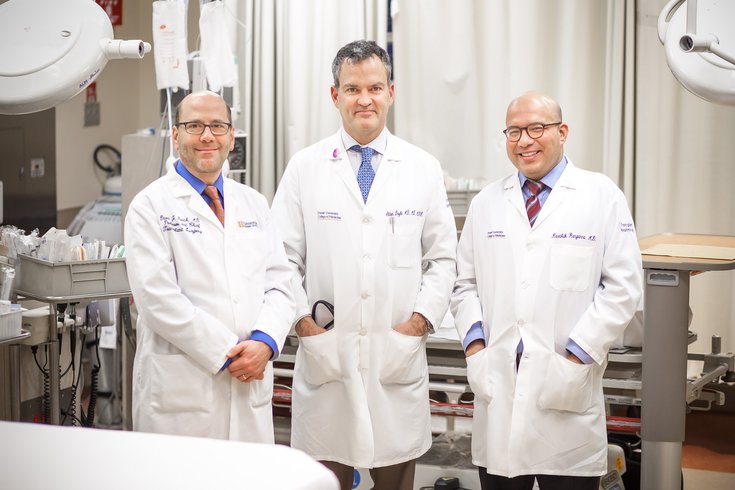
March 15, 2016
 Thom Carroll/PhillyVoice
Thom Carroll/PhillyVoice
Hahnemann University Hospital surgeons from left to right: David Reich, MD, FACS, chief of multi-organ transplantation and hepato-pancreato-biliary surgery; Alden M. Doyle, MD, MS, MPH, Medical Director for Kidney Transplantation; Karthik Ranganna, MD, transplant nephrologist
Hahnemann University Hospital announced Monday that it has received permission to perform kidney and liver transplants from HIV-positive donors to HIV-positive patients, putting it in the running to become the first hospital in the nation to do so.
The news signals hope to HIV-positive patients who want to donate kidneys to spouses or other loved ones who also have HIV. Such donations were not even legal until 2013, when Congress passed the HIV Organ Policy Equity (HOPE) Act.
"It's a positive because it allows the HIV-positive patients who so much want to, to give back," said Dr. David Reich, chief of multi-organ transplantation at Hahnemann.
Hahnemann and Johns Hopkins in Baltimore are the only two hospitals in the United States so far to get permission from the United Network for Organ Sharing to do the transplants, which have only been performed in South Africa. Doctors hope to be able to perform a transplant this year.
While donations from HIV-positive people are new, doctors have plenty of experience with kidney and liver donations to HIV-positive people. Hahnemann has performed more than 110 transplants for HIV-positive people since 2002 and has around 45 people with HIV on its organ waiting list.
"There is a very real pressure of trying to get these folks transplanted as soon as possible, because they're not doing well on dialysis," said Dr. Alden Doyle, director of the hospital's kidney transplant program.
The fact that so many people with HIV need kidney or liver transplants is actually a testament to the success of HIV treatments, because more people are living long enough with the virus to develop other diseases.
"The majority of the time [the need for a transplant] is not due to their HIV," said Dr. Karthik Ranganna, a transplant nephrologist. "Majority of the time, it is because they are doing well with their HIV therapy, and [then develop] hypertension, diabetes, those kinds of illness that cause kidney failure in the rest of the population."
Transplant surgery is more challenging for HIV-positive patients because they are already taking a complex cocktail of medications and have a compromised immune system that puts them at greater risk of infection. Nevertheless, Ranganna said that survival rates are similar to the general population. Many people are unaware that HIV-positive patients can have organ transplants at all.
"They're coming to know that better. It's not perfect, we do see certain barriers, but the barriers are being broken down," said Ranganna.
Another complication that doctors must keep in mind is that there are many different strains of HIV. An organ donor may have a different strain of HIV from the recipient, potentially making their condition worse. But Doyle said that "because of the wide availability of very potent drugs, there's a sense now that we could find a mix of medicines that would work" for different strains of the virus.
Doctors still have much to learn about HIV-to-HIV donations, especially from living donors. They're confident that the transplants will be successful, based on results in South Africa, but, in the end, it is still an experimental procedure that requires participants' informed consent.
"We can report what the experience has been and learn from it," said Doyle.